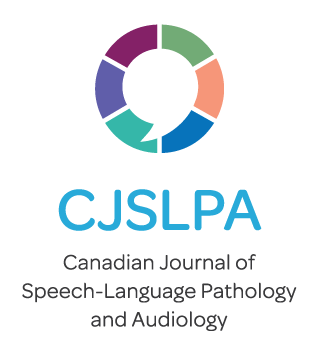

| Author(s) |
Ruth Warick, MA |
| Volume | 18 |
| Number | 4 |
| Year | 1994 |
| Page(s) | 253-259 |
| Language | English |
| Category | |
| Keywords |
disability hearing youth |
| Abstract |
Few studies have been conducted of hard-of-hearing youth, largely because this disability group went unrecognized until a few years ago. In a national study undertaken by the Canadian Hard of Hearing Association, Canadian hard-of-hearing youth (ages 13 to 25 years) were surveyed regarding educational, career, access, social, psychological, and other issues of importance to their well-being and successful integration into society. The results of the study will be shared in terms of their social and cultural implications. The dilemma of hard-of-hearing youth viewing themselves as being the same as everyone else, and being perceived as such due to the invisible nature of their disability, yet growing up with different experiences because of hearing loss, will be explored. Il existe peu d'études sur les jeunes malentendants, principalement parce qu'on a guère prêté attention à ce groupe jusqu'à tout récemment. Dans une enquête menée par l'Association canadienne des malentendants, 150 jeunes (de 13 à 25 ans) ont été interviewés au sujet des problèmes psychologiques et sociaux pertinents à leur bien-être et à leur intégration dans la société: éducation, carrière, accessibilité. Les résultats de l'enquête seront présentés et discutés en fonction de leurs implications sociales et culturelles. Nous discuterons aussi du dilemme des jeunes malentendants, qui se considèrent eux-mêmes et sont perçus par les autres comme semblables à tous les jeunes, à cause du caractère invisible de leur infirmité, mais néanmoins vivent leur jeunesse de façon bien différente. |
| Record ID | 249 |
| Link | https://cjslpa.ca/files/1994_JSLPA_Vol_18/No_04_201-288/Warick_JSLPA_1994.pdf |
CJSLPA is an open access journal which means that all articles are available on the Internet to all users immediately upon publication. Users are allowed to read, download, copy, distribute, print, search, or link to the full texts of the articles, or use them for any other lawful purpose.
CJSLPA does not charge authors publication or processing fees.
Copyright of the Canadian Journal of Speech-Language Pathology and Audiology is held by Speech-Language and Audiology Canada (SAC). Appropriate credit must be given (SAC, publication name, article title, volume number, issue number and page number[s]) but not in any way that suggests SAC endorses you or your use of the work. You may not use this work for commercial purposes. You may not alter, transform, or build upon this work.